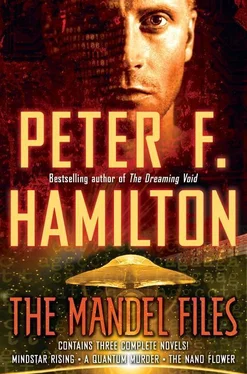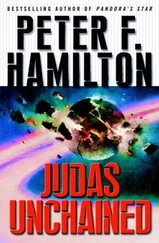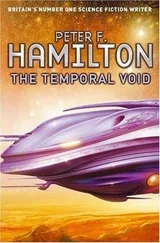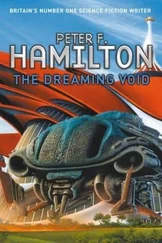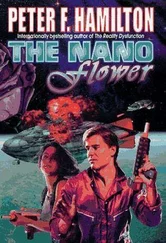I wonder what old Walshaw would make of that one?
It wasn’t that life had been easier in his day, but at least the battle lines were a hell of a lot clearer.
It was hot outside the hypersonic, although Duxford was spared Peterborough’s swamp humidity; that was something he’d never acclimatized to. The plane had landed on the roof of Building One at the Event Horizon Astronautics Institute. It was typical of the space industry to use that kind of nomenclature, he thought, reflecting the medium they dealt in. Cold, vast, and soulless.
Building One was a five-storey ring of offices and laboratories, eight hundred metres in diameter. The circular space they enclosed was covered by a domed solar collector roof, rising up beside him like a crack into space, sucking light and heat from the air. Looking the other way, Victor could just make out the stone buildings of Cambridge’s colleges, trembling in the heat haze. The rest of the city was a pastiche of red brick and black solar panels. Hardly any modern buildings. It made a pleasant change.
Building Three was a clone of Building One, sitting a kilometre away, on the site of the old War Museum buildings, its green-silver glass wall bouncing spears of tinted sunlight at him. Building Three was the big brother of the first two, its outer ring fifteen storeys high, sixteen hundred metres in diameter. A mile, back in Birmingham where Victor grew up, where they still clung to the real England of pints and inches with the obstinacy of people frightened by the seemingly perpetual flux which the Warming had brought early in the millennium. Searching for the sanctuary of stability in erstwhile customs.
Spaceplanes hummed gracefully through the sky, big swept-wing delta shapes; arriving from the west and landing, departures racing away to the east. The long line of pads that accommodated them had been built along Duxford’s old runway, he remembered. The War Museum’s original geography was all very vague in his mind now. He could barely recall the lie of the land before Building One had gone up, seventeen years ago. Change hadn’t stopped after the Greenhouse Effect plateaued, if anything it had redoubled its confusion.
Building Four was half completed, another one the size of Three; the first three storeys of glass already in place, as if the green-silver panes were organic, a crust that grew up the naked concrete and composite structure. And he knew that Julia had begun preliminary discussions with the bankers and finance houses for Building Five.
Even after all this time, after penetrating the Evans mystique, seeing her angry, frightened, sad, and drunk, he still looked on Julia as a figure of awe. People were fascinated by her because of her money, blinded by it. Nobody understood, she had a thousand critics, snipers, detractors. All of them claiming they could do the job better. He knew different, Julia actually cared about the country. In that she was almost unique in an era of multinationalism, the abrasion of significant borders; but she insisted the critical divisions of Event Horizon were all sited in England. The software writers, the research teams, product designers, the factories which produced the ‘ware chips. Other countries were given the assembly lines, the metal-bashing subsidiaries, but the heart of every piece of Event Horizon gear was built in England. That was where the real work lay, the real challenge, real money. The principal reason England’s trade balance was permanently in the black.
And Duxford was the grand prize. Over half of the company’s giga-conductor royalties had been invested here. The Institute pulled together every human engineering discipline, taxed ingenuity to its limits, gave England an unbeatable technological and economic edge over the rest of the European Market Alliance nations. Space hardware subcontracts were only placed with English companies. The external supply industry that had risen to support Julia’s space programme provided secure jobs for over a million people, the Institute itself employed a hundred and fifty thousand at Duxford alone, and more in orbit and up at New London.
The money she poured into orbital materials processing modules and the New London project was frightening. She’d been doing it for a solid fifteen years without ever showing weakness or doubt. And only now was she beginning to get anything like a decent return. Nobody else had that sort of faith; in their own vision, in the scientists, technicians, and astronauts who’d captured the asteroid. Victor knew that if it’d been up to him, he would’ve abandoned space to the kombinates and government agencies a long time ago.
Without Julia Evans the world would be a much poorer place. She cared about people, and nobody appreciated it. Except him.
Victor put a halt on that line of thought. You ridiculous fool, he told himself.
Eddie Coghlan, the Institute’s security division manager, was standing by the open stair door at the edge of the pad. Victor could see the man reviewing his own recent performance in his mind, desperately trying to think why his boss should pay an unexpected visit.
Victor shook Eddie Coghlan’s hand. “You can relax now, Eddie, I’m not here to chase you.”
Eddie Coghian smiled crisply. “That’s something, you had me worried there for a minute.”
They went down the stairs, talking amicably. Eddie Coghian was glad to have the opportunity to discuss a few points, and Victor listened readily enough, making suggestions. He didn’t go for the intimidating approach, a fear figure. He knew there were some company security chiefs who ran their departments on those lines, and wasn’t much impressed. Security was a delicate, complex job; bawling orders like a sergeant-major might look good for the board, but like all dictatorships it was ultimately ineffective.
Access Astronautics Institute Building One Floor Plan, he told his processor node. The three-dimensional glass image formed in his mind.
Display Route from Landing Pad Three to SETI Office. A red dot appeared on the landing pad, and extended a line down the stairs. Perspective shifted to keep the tip of the line in front of his perception point; directional graphics blinked up, naming the sections it was passing through.
When he came out of the stairwell on to the fifth floor’s central corridor, he stepped unerringly on to a moving walkway. He was in an administrative segment, glass walls on either side showing him big open-plan offices with staff bent over desk terminals.
“There’s going to be a rush of reassignment orders for the Institute’s research staff coming through over the next few days,” he told Eddie Coghlan as they slid past the canteen. “Top grades, the real thinker types. So I want you to blow Meterski’s deal, and Kellaway’s.”
“But we haven’t identified all the team members,” Eddie Coghlan said. “If we blow the ones we know, the rest will pull the cutouts and vanish.”
“Can’t be helped. These reassignments are supposed to be ultra-hush, I don’t want them to become open knowledge to the tekmercs. OK?”
“You’re the boss,” Eddie Coghian said glumly. When do you want it done?”
“Today.”
“Christ!”
“Sorry, but that’s the way it goes. I’ll see if I can assign some psychic empaths to you. Have them interrogate the tekmerc members you do nab, that way you should get a reasonably complete list.” He stepped off the walkway at an intersection, and started to ride an escalator down.
“Right you are,” Eddie Coghlan said. “Is that why you’re here, to supervise the reassignments?”
Victor liked that, no questions about what the reassignments were for. Eddie was a good security man. He started down the next escalator to the third floor. “No, I’m here to see Dr Parnell, actually.”
Читать дальше
